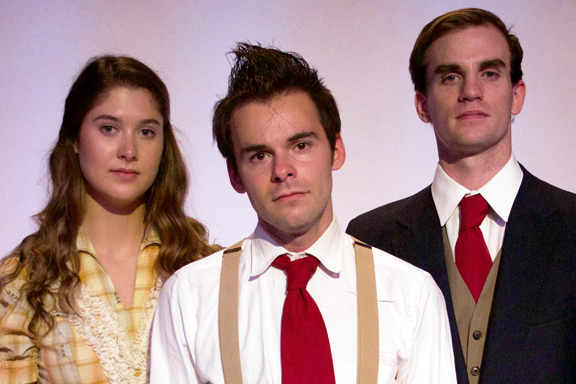
Emotionally compelling, 'Spring Awakening' is driven by a thirst for knowledge and independence
By Tina Farmer
Stray Dog Theatre treats audiences to a new version of one of its favorite previous productions, the coming-of-age musical Spring Awakening, by Stephen Sater and Duncan Sheik. The book is an adaptation of a German play by Frank Wedekind that warns of the tragic consequences of raising children in ignorance and an adherence to strict religious doctrine. Naturally, the authoritarian approach doesn't allow room for questions or curiosity. The problem, of course, is that humans are naturally curious and full of questions, and teenagers particularly so. Then their hormones kick in.
The company turns out a marvelous production of the musical, adding in a few new twists that work to keep the show fresh while underscoring the relevance, or perhaps prevalence, of the themes in contemporary America. Justin Been directs this smart interpretation with a sure hand, Sam Gaitsch provides engaging, equally fresh choreography, and the cast is uniformly compelling, vocally and in character. The parts come together so well, and the little twists and variations are quite effective, helping the show hit home and its themes linger.
Allison Arana shines as Wendla, innocent and uncertain but with a bold spirit and genuine, pleasing voice. She is convincingly unaware of the changes happening to her body and, though she pleads to know more, her mother seems content to keep her in that state.
Arana moves with an uneasy grace, her posture and expressions underscoring conflict and new sensations. Riley Dunn counters her as the more worldly and philosophically curious Melchior. All intellectual rebellion and eager energy, he's a natural leader with a mind that challenges the status quo. Dunn walks with a sure and confident stride through the majority of the play, making the moments when he recoils in horror at his feelings, particularly an overwhelming sense of rage and power, all the more effective.
Stephen Henley, Dawn Schmid, and Brigid Buckley are sympathetic and heartbreaking as Moritz, Ilse, and Martha; their truths are painfully real and poignantly expressed. Jackson Buhr and Luke Steingruby ensure the story of their love is touching, with a slow, shy burn that builds in intensity as the teens explore newfound feelings. All the pairings and longings have that same intensity of youth, an urge for exploration and touch that's wonderfully expressed through Been's directorial choices and the ensemble's commitment to storytelling.
Jan Niehoff and Ben Ritchie are by turns comic and cruel as the Adult Woman and Adult Man, and each transitions fluidly between characters. The schoolmaster and headmistress are stern, rigid creatures of habit, and quite comfortable quashing young spirits. The parental figures range from sympathetic to monstrous to the right measure, ensuring the focus stays on the teenagers' stories. Angela Bubash, Kevin Corpuz, Tristan Davis, Annie Heartney, and Jacob Schalk complete the ensemble. There are several instances when some of the ensemble overact and need to pull back their performance to match the pace and emotional intensity of the moment. This includes a few scenes when they distract from the story, but the cast is generally well synchronized and connected with the story and each other.
Robert M. Kapeller's scenic design evokes the feeling of the town with rough hewn boards and wooden chairs that simply but effectively indicate location as well as adding to the rhythm and choreography during several the songs. A single, gorgeous old tree, to which the piano seems connected, adds the suggestion of nature, representing both a place of sanctuary and unknown danger.
Music director Jennifer Buchheit and the band are scattered along the perimeter of the set, and the piano is used quite effectively, and with seamless switchovers, by the cast and the band. Buchheit directs the score with restraint, finding more levels and effectively employing layering to create a rich tone. The emotional arc of the story is complemented with thoughtful musical interpretations that direct focus to the story context and still allow the exuberance of youth to burst forth, when appropriate. Been and choreographer Gaitsch also make good use of the theater space, with entrances, exits, and several dance sequences moving among the seated patrons. The moves set up the final song well, and while some purists will likely scoff at the shift from past to present, it feels natural and organic in context with the continuing relevance of the material.
As usual, the company takes some risks, and not everyone likes the approach. As an audience member who sees theater frequently, I appreciate the curious and adventurous nature of the company and enjoy the exploration quite a bit. The choices remain true to the story and demeanor of the original, but allow the musical to grow in a way that feels organic and well grounded.
With a substantially new cast and a fresh and inspired approach to key moments, the company once again captures our interest and applause. Director Been, the band, and cast are completely aligned and the pleasing show finds new levels of emotion and expression. Though still beating with a raw and authentic heart, Stray Dog Theatre's production of Spring Awakening, running through October 21, is much more than a revival of a previous success.


